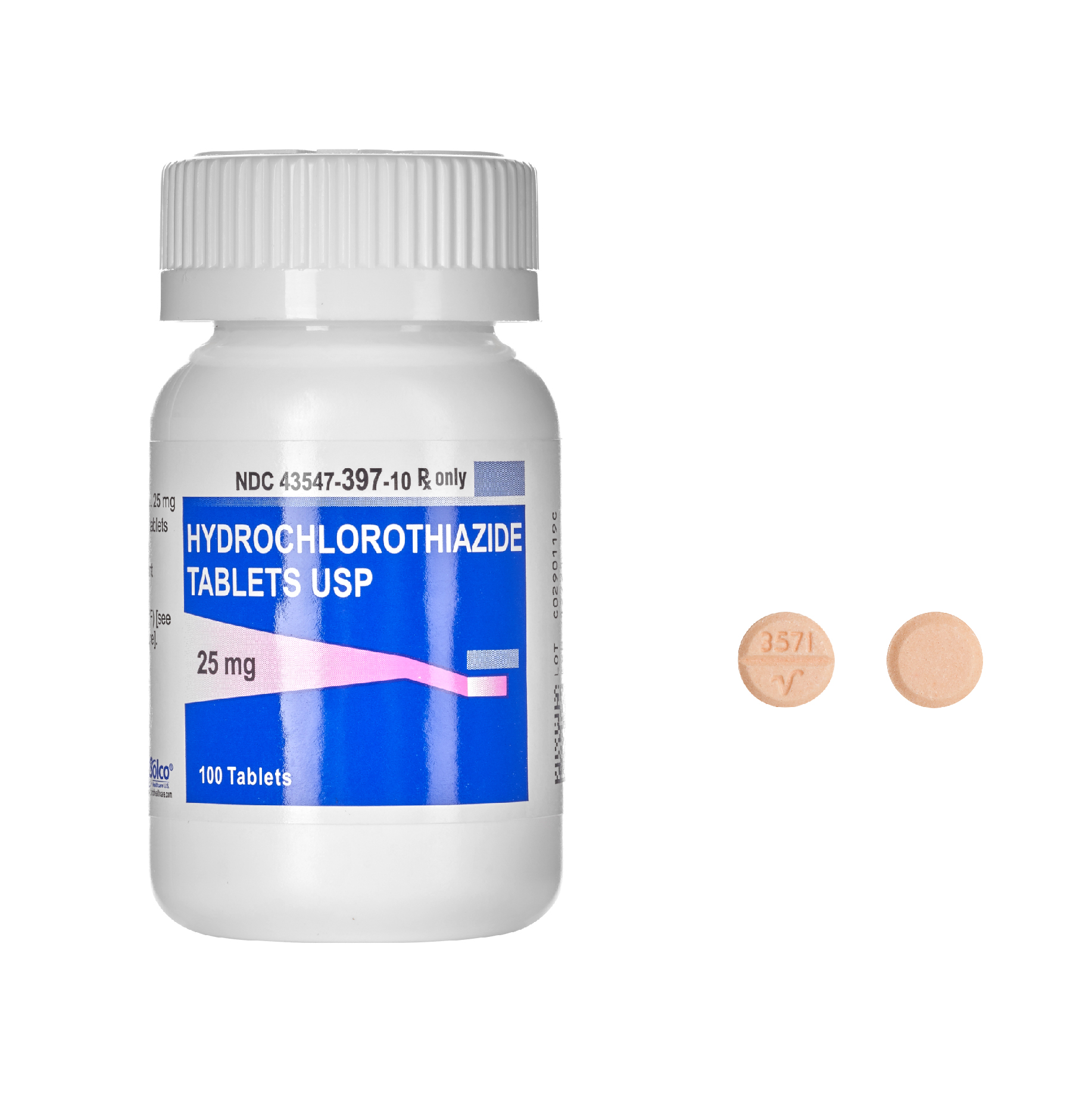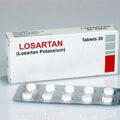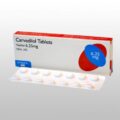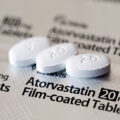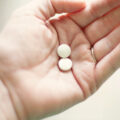What is hydrochlorothiazide?
Hydrochlorothiazide is a prescription drug used alone or in combination with other medications to treat high blood pressure. Hydrochlorothiazide is used to treat edema (fluid retention; excess fluid held in body tissues) caused by various medical problems, including heart, kidney, and liver disease, and to treat edema caused by using certain medications including estrogen and corticosteroids.
Two companies, Merck and Ciba, discovered the medication which became commercially available in 1959. It is on the World Health Organization’s List of Essential Medicines. It is available as a generic drug and is relatively affordable. In 2019, it was the eleventh most commonly prescribed medication in the United States, with more than 38 million prescriptions.
How it works
Hydrochlorothiazide belongs to a class of drugs called thiazide diuretics. A class of drugs is a group of medications that work in a similar way. These drugs are often used to treat similar conditions.
It isn’t known exactly how hydrochlorothiazide works. It’s thought that it works to remove excess salt and water from your body. This action keeps your heart from working as hard to pump blood, which lowers blood pressure and reduces swelling.
How should I take hydrochlorothiazide?
Hydrochlorothiazide comes as a tablet, capsule, and solution (liquid) to take by mouth. It usually is taken once or twice a day. When used to treat edema, hydrochlorothiazide may be taken daily or only on certain days of the week.
The typical dosing for hydrochlorothiazide is as follows:
- High blood pressure: Hydrochlorothiazide (Microzide) is typically started at 12.5 mg to 25 mg by mouth once daily for hypertension. It can be increased to 50 mg per day either as a single dose or split into two doses.
- Fluid retention: Typical dosing for hydrochlorothiazide (Microzide) is between 25 mg and 100 mg per day, and can be as high as 200 mg for edema. This can be taken as a single dose or divided doses throughout the day.
Follow the directions on your prescription label carefully, and ask your doctor or pharmacist to explain any part you do not understand. Take hydrochlorothiazide exactly as directed. Do not take more or less of it or take it more often than prescribed by your doctor.
Hydrochlorothiazide controls high blood pressure but does not cure it. Continue to take hydrochlorothiazide even if you feel well. Do not stop taking hydrochlorothiazide without talking to your doctor.
What happens if I take a double dose of hydrochlorothiazide?
If I take a double dose of hydrochlorothiazide, you might experience overdose symptoms which may include:
- Dizziness
- Dry mouth
- Muscle pain or weakness
- Nausea
- Thirst
All these happen because your blood pressure might drop too low. If you think you’ve taken too much of this drug, call the poison control helpline at 1-800-222-1222. Information is also available online at https://www.poisonhelp.org/help. If the victim has collapsed, had a seizure, has trouble breathing, or can’t be awakened, immediately call emergency services at 911.
Will a double dose of hydrochlorothiazide make you pee?
Yes, a double dose of hydrochlorothiazide can make you pee excessively because the medication is a diuretic (water pill) that causes you to make more urine, which helps your body get rid of extra fluid (water).
Can you die from hydrochlorothiazide overdose?
Yes, hydrochlorothiazide overdose can result in a sudden and dangerous fall in blood pressure. A change of just 20 mm Hg — a drop from 110 mm Hg systolic to 90 mm Hg systolic, for example — can cause dizziness and fainting. And big drops, from large doses of hydrochlorothiazide, can be life-threatening.
Hydrochlorothiazide side effects
Hydrochlorothiazide can cause mild or serious side effects. The following list contains some of the key side effects that may occur while taking hydrochlorothiazide. This list does not include all possible side effects.
For more information on the possible side effects of hydrochlorothiazide, or tips on how to deal with a troubling side effect, talk with your doctor or pharmacist.
More common side effects
The more common side effects that can occur with hydrochlorothiazide include:
- blood pressure that’s lower than normal (especially when standing up after sitting or lying down)
- dizziness
- headache
- weakness
- erectile dysfunction (trouble getting or keeping an erection)
- tingling in your hands, legs, and feet
- photosensitivity (a condition where your skin is more sensitive to the sun)
- muscle spasms
- diarrhea
These effects may go away within a few days or a couple of weeks. If they’re more severe or don’t go away, talk with your doctor or pharmacist.
Serious side effects
Call your doctor right away if you have serious side effects. Call 911 if your symptoms feel life-threatening or if you think you’re having a medical emergency. Serious side effects and their symptoms can include the following:
- severe skin reactions such as Stevens-Johnson syndrome and exfoliative dermatitis, with symptoms such as:
o painful skin rash
o skin peeling and blisters
o fever
o mouth sores
- kidney failure, with symptoms such as:
o weakness
o shortness of breath
o tiredness
o confusion
o abnormal heart rate or chest pain
o producing less urine than normal
o increased swelling in your legs, ankles, or feet
- blurred vision, with symptoms such as:
o eye pain
o trouble seeing
- pancreatitis (inflammation in the pancreas), with symptoms such as:
o upset stomach or vomiting
o very bad stomach or back pain
Taking hydrochlorothiazide oral tablets with other drugs
Your doctor may prescribe hydrochlorothiazide on its own for the conditions it’s approved to treat. But in some cases, they may prescribe the drug with other medications.
For example, it’s not unusual for people with high blood pressure to take more than one medication for their condition. Other blood pressure medications that may be used together with hydrochlorothiazide include:
- angiotensin-converting enzyme (ACE) inhibitors, such as lisinopril
- angiotensin II receptor blockers (ARBs), such as valsartan and losartan
- calcium channel blockers (CCBs), such as amlodipine (Norvasc)
- diuretics other than hydrochlorothiazide, such as triamterene (Dyrenium)
Hydrochlorothiazide may also be prescribed together with potassium. This is because hydrochlorothiazide can cause a low potassium level as a side effect. Your doctor may have you take a potassium pill with hydrochlorothiazide to help prevent or treat this side effect.
Additionally, hydrochlorothiazide is sometimes included in combination drugs. These are medications that contain one or more active drugs in a single pill.
Combination drugs can make it easier to remember to take your medications because you have fewer pills. But combination medications are often more expensive than individual drugs.
Examples of combination drugs that contain hydrochlorothiazide include:
- hydrochlorothiazide and lisinopril (Zestoretic)
- hydrochlorothiazide and triamterene (Maxzide)
- hydrochlorothiazide and losartan (Hyzaar)
- hydrochlorothiazide and valsartan (Diovan HCT)
Your doctor or pharmacist can give you more information about combination drugs and using hydrochlorothiazide with other drugs.


